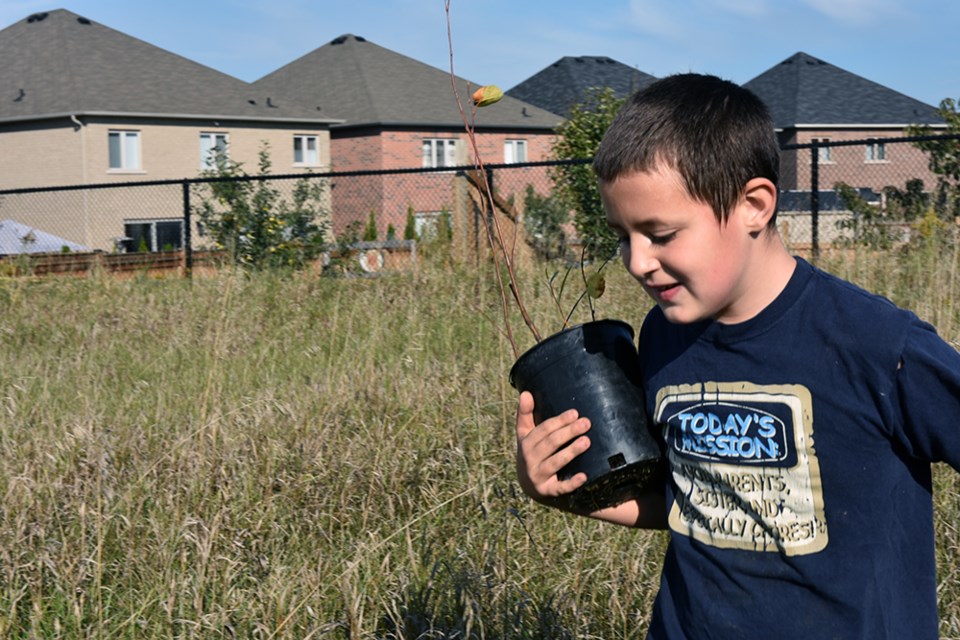The sloping north side of the school yard at Fieldcrest Elementary is currently a weed-covered field, but students have already begun the transformation that will restore the natural vegetation and create a space that provides a connection to nature.
The ‘Weed the North’ project started last year, when a group of students at Fieldcrest in Bradford began exploring what it means to be a global citizen in terms of responsibility and action.
“They were engaging with the issues facing humanity and the environment,” explained teacher Anne Wright.
The students were especially fascinated by the fact that before the school was built, the property was farmland and before that, forest.
They looked at the weedy, overgrown field and came up with a plan to “refurbish” and restore the property, creating a “no mow” zone that would preserve natural habitat for the future.
“They wanted to plant native species, create pathways, plant shrubbery, and make a conservation area for students, staff and our community to learn from and preserve,” noted Wright.
They wanted to not only have a positive impact on the community, but leave the world a better place.
It was a big plan and a big vision, that was going to need big support to be more than just a dream.
Luckily, the students had that support. The Simcoe County District School Board Experiential Learning Department provided a $2,000 grant, which was matched by Fieldcrest’s School Council.
The Lake Simcoe Region Conservation Authority (LSRCA) became a major partner, providing expertise and financial support, helping the kids come up with a four-phase plan to reclaim the overgrown field, even providing the native tree saplings that the students could plant.
The only thing standing in the way was COVID-19.
COVID closures and remote learning effectively meant that the project - named ‘Weed the North’ to reflect the students’ love of basketball and the Toronto Raptors - had to be postponed.
It wasn’t until this past week that students were able to get out into “their” field, and begin planting.
On Thursday, the LSRCA’s Peter Shuttleworth, who has been liaising with the school, brought shovels and 100 young saplings to be planted, including oaks, hackberry, Eastern white cedar and Grey Dogwood.
Students were joined by LSRCA staff, teachers, and two special guests – BWG Mayor Rob Keffer and Coun. Ron Orr – who helped with the planting.
“This is the first planting event that we’re doing here,” said Shuttleworth. He noted it would have been possible to plant trees this spring, “but because of our restrictions, only staff would have been involved, and that kind of defeated the purpose: to have the students take some stewardship of their property, take some pride in their natural heritage.”
In addition to the trees provided by the conservation authority, students also raised their own saplings.
“First, we learned about it in our classroom. We were experimenting – growing little trees and planting them. It was hard work,” said one student. The hardest part? “The growing. It takes a long time!”
Asked what he wanted to see, in the Weed the North field, he quickly answered, “A big forest, where I can play tag – like Scanlon Creek.”
School Vice Principal Martin Orr watched the start of the restoration efforts.
“Our plan is to make a path through here, to make this land a little more useful,” he explained, providing an educational outdoor experience.
Fieldcrest is a big school, Orr noted, with 21 portables. “It’s like a school outside of the school,” he said, pointing out that even when a new elementary school is built in Bradford and school boundaries are redrawn, “our school is going to remain big, with several portables.”
Having an outdoor area, planted with native trees and shrubs, dotted with meadow openings and crossed by accessible walkways, will provide a much-needed connection to nature for the school’s students.
It will be about “mindfulness,” said Wright. Plans call for the walkways to be posted with plaques offering “mindfulness exercises: What is it you are hearing? What is it you are seeing? How does it make you feel?”
The pandemic created challenges for the students, adding to feelings of uncertainty, social pressure, disconnection. It made the Weed the North project all the more important.
“This was the one thing that gave them some control in their lives. It was good for all of us,” Wright said of the planning, the determination to protect the environment, the hands-on activities. “When it all started out, they just wanted to make a difference in their community… It became so much more.”
She added, “The students are really showing themselves as leaders. They are really invested in it.”
“In today’s world we need to have the kids know how to use nature and the environment, and put themselves in a different place,” said Coun. Ron Orr, as he watched the young environmental stewards plant the trees.
Weed the North is more than just a one-time tree-planting. It is a long-term project that will take years to implement and will impact the students, the school and the community for years to come.
“As the trees grow, they can look back and say they were part of that,” Wright said.
“Down the line, we’ll develop more restoration efforts,” said Shuttleworth. “Hopefully we get some more schools involved. It benefits the watershed, but it really benefits the kids, getting hands-on.
“It will transform,” he said, not only the landscape but everyone involved.



